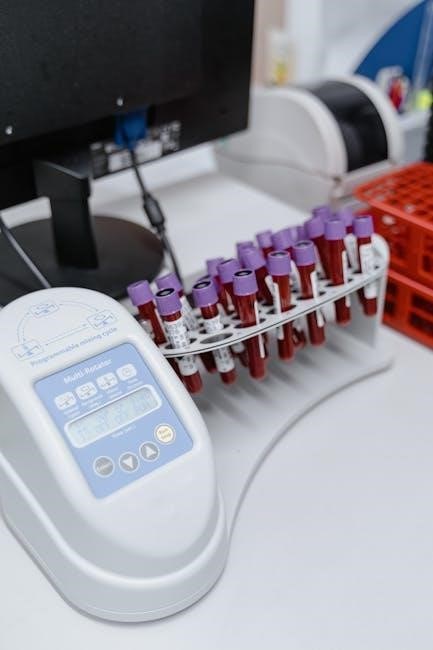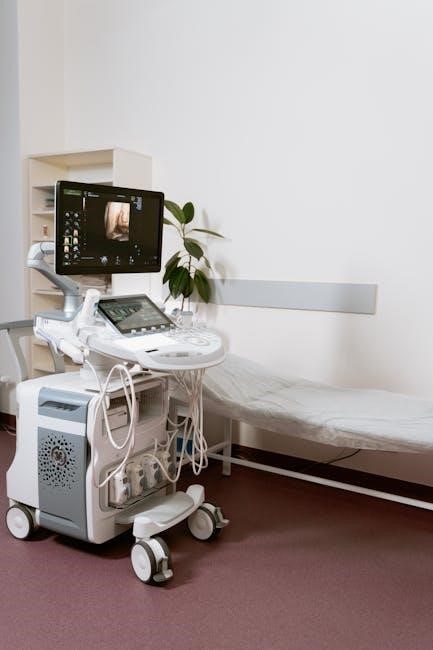The Mississippi Aphasia Screening Test (MAST) is a brief, repeatable screening tool designed to assess expressive and receptive language abilities in individuals with aphasia.
1.1 Overview of the MAST and its purpose

The Mississippi Aphasia Screening Test (MAST) is a concise screening tool designed to evaluate expressive and receptive language abilities in individuals with aphasia. It is particularly useful for identifying language deficits in patients with neurological disorders, including multiple sclerosis (MS). The MAST aims to provide a quick and reliable assessment of aphasic symptoms, aiding clinicians in early detection and monitoring of language impairments. Its simplicity and brevity make it an effective resource for clinical settings, ensuring timely interventions for individuals with communication challenges.
1.2 Development and validation of the MAST
The MAST was developed to address the need for a brief, reliable screening tool for aphasia, particularly in patients with severe language impairments. Its validation involved clinical testing across diverse neurological populations, ensuring its effectiveness in assessing both expressive and receptive language functions. The test’s design incorporates straightforward tasks, such as object naming and sentence repetition, to accurately identify aphasic deficits. This structured approach ensures consistency and reliability in clinical applications, making the MAST a valuable diagnostic resource.

The Role of Aphasia in Multiple Sclerosis (MS)
Aphasia in MS is rare but can occur due to lesions affecting language areas. It impacts communication, often requiring specific screening tools like the MAST for accurate assessment.
2.1 Understanding aphasia in MS patients
Aphasia in MS patients typically results from lesions in white or cortical-white matter junctions, affecting language processing. It manifests as difficulties in speech production or comprehension, varying in severity. Unlike stroke-related aphasia, MS-related aphasia often fluctuates with disease activity. Early identification through tools like the Mississippi Aphasia Screening Test (MAST) is crucial for timely intervention and rehabilitation strategies.
2.2 Cognitive and linguistic deficits associated with MS
Multiple sclerosis (MS) often leads to cognitive deficits, including impaired memory, attention, and processing speed. Linguistic deficits, such as aphasia, arise from damage to language-processing areas. These deficits can affect communication, problem-solving, and daily functioning. Early screening tools like the Mississippi Aphasia Screening Test (MAST) help identify these issues, enabling tailored interventions to improve quality of life for MS patients.

Screening Tools for Aphasia in MS
The Mississippi Aphasia Screening Test (MAST) is a key tool for assessing aphasia in MS patients, alongside other tests like BICAMS and SDMT, to evaluate cognitive and linguistic deficits.
3.1 The MAST as a screening tool
3.1 The MAST as a Screening Tool
The Mississippi Aphasia Screening Test (MAST) is a concise and effective screening tool for assessing aphasia in MS patients. It evaluates both expressive and receptive language abilities, making it a valuable resource for clinicians. The test is designed to be brief, ensuring it can be administered repeatedly without causing fatigue; Its focus on core language functions helps identify specific deficits, guiding targeted interventions. This makes the MAST a practical choice for monitoring disease progression and treatment responses in MS patients with aphasia.
3.2 Other cognitive screening tests used in MS
3.2 Other Cognitive Screening Tests Used in MS
Beyond the MAST, other cognitive screening tools are employed in MS management. The Brief International Cognitive Assessment for MS (BICAMS) is widely used, incorporating tests like the California Verbal Learning Test-II (CVLT-II) for verbal memory and the Brief Visuospatial Memory Test-Revised (BVMT-R) for visual memory. The Symbol Digit Modalities Test (SDMT) assesses processing speed and cognitive function. These tools provide comprehensive insights into cognitive deficits, aiding in early detection and monitoring of MS-related cognitive impairments, ensuring timely intervention and personalized care plans.

Cognitive Assessments in MS
Cognitive assessments in MS include tools like BICAMS and SDMT, evaluating memory, processing speed, and attention to detect impairments early for better management and care.

4.1 Brief International Cognitive Assessment for MS (BICAMS)
BICAMS is a standardized, brief cognitive assessment tool designed specifically for MS patients. It evaluates memory, processing speed, and attention, providing a comprehensive overview of cognitive function. The test is widely used in clinical settings to monitor disease progression and guide therapeutic interventions. BICAMS’ brevity and ease of administration make it an essential component in managing MS-related cognitive impairments effectively.
4.2 Symbol Digit Modalities Test (SDMT)
The Symbol Digit Modalities Test (SDMT) is a widely used screening tool for assessing cognitive functions such as attention, visual scanning, and processing speed. It involves the rapid conversion of geometric symbols into corresponding digits, providing a measure of cognitive efficiency. SDMT is particularly valuable in MS for detecting subtle cognitive changes and monitoring disease progression. Its brevity and reliability make it a practical choice for clinical settings, aiding in early identification and management of cognitive impairments.

Limitations of Screening Tests in MS Patients
Screening tests for MS patients with aphasia often have limited accuracy due to hearing impairments and the complexity of language deficits, requiring specialized expertise for interpretation.
5.1 Challenges in assessing patients with aphasia
Assessing aphasia in MS patients is challenging due to varying degrees of language deficits and cognitive impairments. Hearing impairments further complicate accurate screening, requiring specialized tools and expertise to ensure reliable results and proper diagnosis. The complexity of aphasia symptoms often demands comprehensive neuropsychological evaluations beyond basic screening tests, highlighting the need for integrated assessment approaches in clinical settings to address these multifaceted challenges effectively.
5.2 Limited value in patients with hearing impairments
Patients with hearing impairments face significant challenges during aphasia screening, as many tests rely on auditory instructions or verbal responses. This limitation reduces the accuracy of tools like the MAST, which may fail to capture the true extent of language deficits. Additionally, hearing loss can lead to misinterpretation of results, emphasizing the need for alternative assessment methods tailored to these patients to ensure reliable and accurate cognitive evaluations in clinical settings.

Case Studies and Clinical Applications
Real-world examples highlight the MAST’s effectiveness in identifying aphasia in MS patients, aiding clinicians in early intervention and personalized treatment plans to improve communication outcomes.
6.1 Real-world examples of MAST implementation
The MAST has been successfully implemented in clinical settings to assess aphasia in MS patients, aiding early detection and monitoring of language deficits. For instance, a 45-year-old MS patient exhibited improved communication outcomes following targeted interventions guided by MAST results, demonstrating its practical utility in neurological rehabilitation.
6.2 Neuropsychological screening in MS patients
Neuropsychological screening in MS patients involves assessing cognitive domains like memory, attention, and executive function. Tools like the BICAMS and SDMT are commonly used alongside the MAST to provide a comprehensive evaluation. This integrated approach ensures early detection of cognitive impairments, enabling timely interventions and improving patient outcomes. Regular screenings help track disease progression and adapt treatment plans accordingly, emphasizing the importance of multidimensional assessments in managing MS effectively.

Future Directions in Aphasia Screening for MS
Future advancements in aphasia screening may incorporate digital tools and AI to enhance accuracy and accessibility, improving early detection and monitoring in MS patients effectively.
7.1 Advancements in screening technologies
Advancements in screening technologies for aphasia in MS patients may involve digital platforms and AI-driven tools to enhance accuracy and accessibility. Telemedicine integration could enable remote screenings, improving early detection. Machine learning algorithms might analyze speech patterns more precisely, reducing human error. Additionally, wearable devices could monitor cognitive changes over time, providing real-time data for better disease management. These innovations aim to make screenings more efficient and accessible for individuals with MS.
- Digital platforms for remote screenings
- AI-driven tools for precise analysis
- Wearable devices for real-time monitoring
7.2 The role of technology in improving test accuracy
Technology plays a pivotal role in enhancing the accuracy of aphasia screening tests for MS patients. AI-driven tools and machine learning algorithms can analyze speech patterns and language deficits with greater precision, reducing human error. Digital platforms also enable real-time data collection and automated scoring, ensuring consistency across assessments. Additionally, telemedicine platforms improve accessibility, allowing remote screenings that reach a broader population. These advancements collectively contribute to more accurate and reliable test outcomes.
- AI-driven tools for precise speech analysis
- Automated scoring systems
- Telemedicine for remote assessments
The Mississippi Aphasia Screening Test (MAST) is a valuable tool for assessing language deficits in MS patients, emphasizing the importance of early and accurate screening for improved outcomes.
8.1 Summary of key findings
The Mississippi Aphasia Screening Test (MAST) has proven to be a reliable tool for identifying language deficits in MS patients. Its brevity and repeatability make it ideal for clinical settings. Early detection of aphasia and cognitive impairments is crucial for timely intervention. The integration of MAST with other assessments, like BICAMS and SDMT, enhances comprehensive evaluation. Despite its effectiveness, challenges remain in assessing patients with severe aphasia or hearing impairments. Overall, MAST plays a vital role in improving outcomes for MS patients through accurate screening.
8.2 Importance of early and accurate screening
Early and accurate screening is essential for identifying aphasia and cognitive deficits in MS patients, enabling timely interventions. The MAST and other tools like BICAMS and SDMT facilitate early detection, which can significantly improve patient outcomes. Prompt identification of language and cognitive impairments allows for targeted therapies, slowing disease progression and enhancing quality of life. Accurate screening also aids in managing symptoms effectively and personalizing treatment plans, emphasizing its critical role in MS care.
